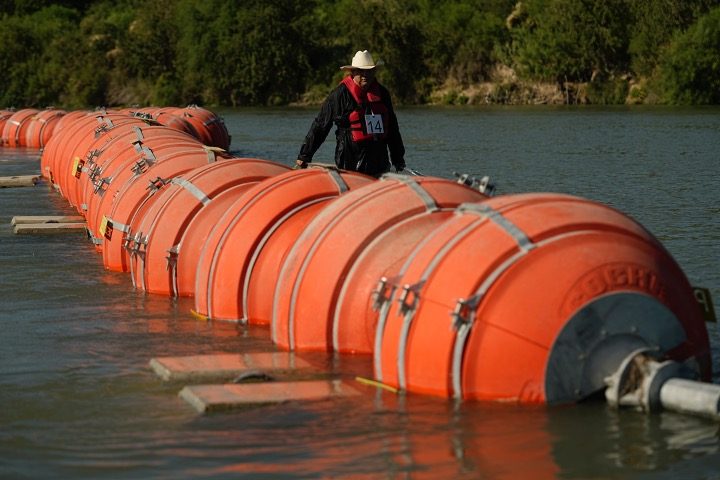
A federal judge granted a preliminary injunction against the State of Texas and Governor Greg Abbott on Wednesday ordering that the floating border barrier in the Rio Grande be moved, as it “irreparably harms the public safety, navigation, and the operations of federal agency officials in and around the Rio Grande.”
Wednesday’s order comes after Judge David Ezra of the U.S. District Court in Austin reviewed final arguments that were presented last month in the ongoing lawsuit over the placement of the 1,000-foot floating barrier, part of Abbott’s Operation Lone Star.
Ezra wrote:
With respect to the buoy barrier that is currently in place, this is a Preliminary Injunction and not a final disposition of this case on the full merits, so this Court is counseled to act in a measured way. As a result, the Court is directing that the buoy barrier be moved from the main waters of the Rio Grande River to the riverbank, rather than removal entirely from the river, so that the barrier does not impede or impair in any way navigation by airboats or other shallow draft craft along the Rio Grande River.
The order requires Texas to reposition all buoys, anchors, and other related materials composing the floating barrier to the bank of the Rio Grande on the Texas side of the river by September 15.
Judge Ezra cited in the injunction that Governor Abbott “announced that he was not ‘asking for permission’ for Operation Lone Star, the anti-immigration program under which Texas constructed the floating barrier.” He continued, “Unfortunately for Texas, permission is exactly what federal law requires before installing obstructions in the nation’s navigable waters.”
In June, Governor Abbott had the floating barriers deployed near Eagle Pass to deter illegal crossings along the Rio Grande. The New American reported then that, according to The Washington Post, “the Border Patrol’s Del Rio Sector, where Eagle Pass is located, has become one of the deadliest places along the U.S. southern border. Migrants are routinely swept away by powerful river currents, and more than 200 deaths were recorded in the sector between 2017 and 2021, the latest year for which U.S. Customs and Border Protection statistics are available.”
The Department of Justice filed the suit over the barrier against Abbott and the State of Texas in late July, prompting the governor to send a letter to President Biden defending the barrier placement. Abbott cited his role in asserting Texas’s “sovereign interest in protecting [her] borders,” stating that Biden’s “ongoing violation of Article IV, § 4 of the U.S. Constitution has left me no other choice.”
The Hill, reporting on the injunction, wrote:
The ruling was deeply critical of Texas’s arguments to defend the installation, in particular the idea that the state is allowed any means to respond to any act it considers an “invasion.”
“And all Texas’s new argument does is ask the Court to take the additional step — beyond the nonjusticiable question of whether the federal government has failed to protect Texas from invasion — of sanctioning Texas’s assertion of plenary power to declare and respond to ‘all types of invasions, including invasions from non-state or quasistate actors,’” Ezra wrote.
“Under this logic, once Texas decides, in its sole discretion, that it has been invaded, it is subject to no oversight of its ‘chosen means of waging war.’ Such a claim is breathtaking.”
Shortly after the injunction was issued, Abbott and the State of Texas filed a notice of appeal and released the following statement:
Texas will appeal. Today’s court decision merely prolongs President Biden’s willful refusal to acknowledge that Texas is rightfully stepping up to do the job that he should have been doing all along. This ruling is incorrect and will be overturned on appeal. We will continue to utilize every strategy to secure the border, including deploying Texas National Guard soldiers and Department of Public Safety troopers and installing strategic barriers. Our battle to defend Texas’ sovereign authority to protect lives from the chaos caused by President Biden’s open border policies has only begun. Texas is prepared to take this fight all the way to the U.S. Supreme Court.
To learn more about the border crisis and what to do about it, click here.



